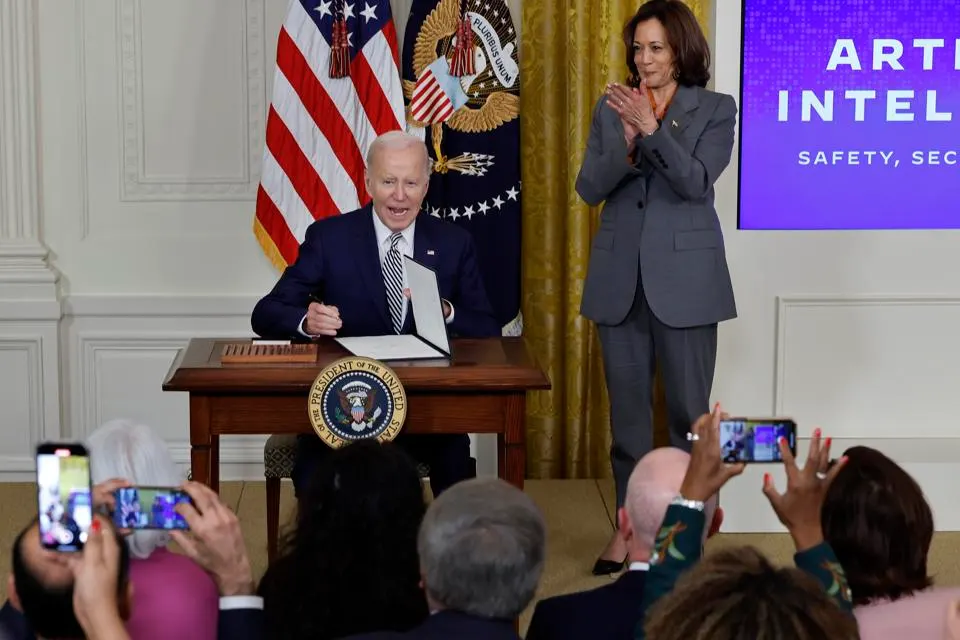The Biden administration's AI strategy aims to boost innovation, security, and sustainable development in the U.S.

March 1, 2025
Artificial Intelligence (AI) has become a crucial element in economic growth, national security, and technological innovation. Recognizing its significance, the Biden administration has rolled out an ambitious strategy to strengthen AI investment and research across the United States. This plan focuses on increasing government funding, fostering collaboration between public and private sectors, ensuring ethical AI development, and maintaining the U.S. as a global leader in AI advancements.
The Need for a Strong AI Investment StrategyAI is transforming industries such as healthcare, finance, defense, and transportation. With major economies like China and the European Union ramping up their AI initiatives, the U.S. government aims to accelerate its AI research and infrastructure investments to remain competitive.
The Biden administration’s AI strategy revolves around:
The Biden administration has proposed a multi-billion-dollar initiative to fund AI research. Under this plan:
According to the White House, these investments aim to ensure the U.S. remains at the forefront of AI breakthroughs, with applications spanning from healthcare diagnostics to autonomous defense systems.
Strengthening Public-Private AI CollaborationOne of the key aspects of the AI strategy is fostering stronger collaborations between government agencies, academic institutions, and private tech companies. The administration is working closely with AI leaders such as Google, Microsoft, OpenAI, and IBM to develop advanced AI models while ensuring responsible AI deployment.
Additionally, the government is introducing AI grants and tax incentives to encourage startups to drive AI innovation in fields like robotics, natural language processing, and cybersecurity.
Establishing an Ethical and Regulatory FrameworkWith AI’s rapid expansion, ethical concerns surrounding bias, misinformation, and data privacy have become a growing challenge. The Biden administration has emphasized the importance of responsible AI governance by:
By implementing these policies, the government aims to prevent the misuse of AI while ensuring its benefits are accessible to all.
AI and National SecurityArtificial intelligence plays a critical role in national security. The Pentagon and intelligence agencies are investing heavily in AI-driven cybersecurity, surveillance, and military defense systems. The Biden administration’s AI strategy includes:
The U.S. government is also working on international AI alliances to ensure that AI technology is used responsibly in military applications.
Incentives for AI Startups and InnovationStartups are at the forefront of AI innovation. To support small businesses and AI entrepreneurs, the Biden administration has:
By supporting AI startups, the administration hopes to drive job creation and technological advancements that benefit the economy.
Global AI Competition and the U.S. ResponseThe U.S. faces increasing AI competition from countries like China, which has outlined a national AI development plan aimed at becoming the global leader in AI by 2030. In response, the Biden administration is strengthening AI collaboration with allies like the European Union, Canada, and Japan to ensure democratic AI leadership.
The U.S. is also working on AI trade agreements to promote ethical AI practices worldwide while preventing AI misuse in authoritarian regimes.
AI’s Impact on the U.S. EconomyAI is projected to contribute trillions of dollars to the global economy in the coming years. The Biden administration believes AI investments will:
AI is expected to play a key role in shaping the future workforce, and the government is investing in AI education programs to equip students and professionals with the necessary skills to succeed in an AI-driven economy.

New AI Investment Guidelines: Impact on Tech Investors
The U.S. has introduced new guidelines for AI investments, aiming to address security concerns and market dynamics. Here's how the new rules will affect tech investors

Biden Administration Unveils New AI Investment Regulations
The Biden administration has unveiled new regulations aimed at overseeing AI investments to ensure national security, ethical development, and responsible growth in the tech sector

The US tightens AI investment regulations to curb foreign influence and strengthen national security
The US government has introduced stricter AI investment restrictions to prevent foreign influence in critical AI sectors. The new regulations aim to protect national security, enhance compliance measures, and promote domestic AI innovation. These changes will impact AI startups, investors, and international partnerships.

US to Restrict Foreign AI Investments
The U.S. government is exploring new policies to limit foreign investments in artificial intelligence (AI) technologies to safeguard national security and maintain technological leadership

US AI Investment Rules Shake Global Markets
The U.S. government’s new regulations to limit foreign investments in AI technologies could disrupt global markets, reshaping investment flows, innovation, and competition

Economic Impact of US AI Investment Policy Changes
The U.S. government’s shift in policy to restrict foreign investments in AI technologies could disrupt both the U.S. economy and the global market, influencing technological progress and global competition

How U.S. Policies Are Shaping the Future of AI Investments
The U.S. government is introducing new investment policies to regulate AI growth, ensuring national security, ethical development, and responsible innovation

How the US is Regulating AI Investments for Security & Growth
The US government has unveiled new measures to regulate AI funding, focusing on national security, ethical AI development, and strategic investment control

New regulations are reshaping AI investments, funding, and growth
New investment laws are set to reshape the AI industry, affecting funding, foreign investments, and innovation. Learn how these regulations impact AI growth
The Atlantic Daily
Get our guide to the day’s biggest news and ideas, delivered to your inbox every weekday and Sunday mornings. See more newsletters
.webp)
Ideas That Matter
Subscribe and support more than 160 years of independent journalism.
Subscribe